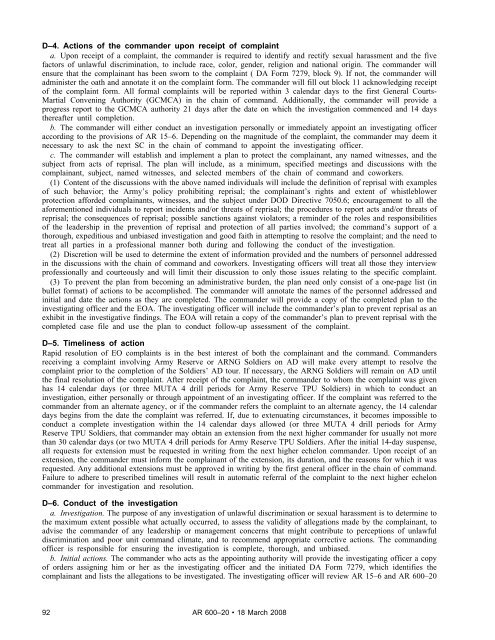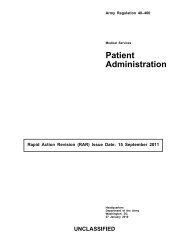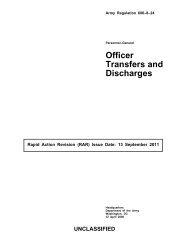AR 600-20, Army Command Policy - Army Publishing Directorate ...
AR 600-20, Army Command Policy - Army Publishing Directorate ...
AR 600-20, Army Command Policy - Army Publishing Directorate ...
You also want an ePaper? Increase the reach of your titles
YUMPU automatically turns print PDFs into web optimized ePapers that Google loves.
D–4. Actions of the commander upon receipt of complaint<br />
a. Upon receipt of a complaint, the commander is required to identify and rectify sexual harassment and the five<br />
factors of unlawful discrimination, to include race, color, gender, religion and national origin. The commander will<br />
ensure that the complainant has been sworn to the complaint ( DA Form 7279, block 9). If not, the commander will<br />
administer the oath and annotate it on the complaint form. The commander will fill out block 11 acknowledging receipt<br />
of the complaint form. All formal complaints will be reported within 3 calendar days to the first General Courts-<br />
Martial Convening Authority (GCMCA) in the chain of command. Additionally, the commander will provide a<br />
progress report to the GCMCA authority 21 days after the date on which the investigation commenced and 14 days<br />
thereafter until completion.<br />
b. The commander will either conduct an investigation personally or immediately appoint an investigating officer<br />
according to the provisions of <strong>AR</strong> 15–6. Depending on the magnitude of the complaint, the commander may deem it<br />
necessary to ask the next SC in the chain of command to appoint the investigating officer.<br />
c. The commander will establish and implement a plan to protect the complainant, any named witnesses, and the<br />
subject from acts of reprisal. The plan will include, as a minimum, specified meetings and discussions with the<br />
complainant, subject, named witnesses, and selected members of the chain of command and coworkers.<br />
(1) Content of the discussions with the above named individuals will include the definition of reprisal with examples<br />
of such behavior; the <strong>Army</strong>’s policy prohibiting reprisal; the complainant’s rights and extent of whistleblower<br />
protection afforded complainants, witnesses, and the subject under DOD Directive 7050.6; encouragement to all the<br />
aforementioned individuals to report incidents and/or threats of reprisal; the procedures to report acts and/or threats of<br />
reprisal; the consequences of reprisal; possible sanctions against violators; a reminder of the roles and responsibilities<br />
of the leadership in the prevention of reprisal and protection of all parties involved; the command’s support of a<br />
thorough, expeditious and unbiased investigation and good faith in attempting to resolve the complaint; and the need to<br />
treat all parties in a professional manner both during and following the conduct of the investigation.<br />
(2) Discretion will be used to determine the extent of information provided and the numbers of personnel addressed<br />
in the discussions with the chain of command and coworkers. Investigating officers will treat all those they interview<br />
professionally and courteously and will limit their discussion to only those issues relating to the specific complaint.<br />
(3) To prevent the plan from becoming an administrative burden, the plan need only consist of a one-page list (in<br />
bullet format) of actions to be accomplished. The commander will annotate the names of the personnel addressed and<br />
initial and date the actions as they are completed. The commander will provide a copy of the completed plan to the<br />
investigating officer and the EOA. The investigating officer will include the commander’s plan to prevent reprisal as an<br />
exhibit in the investigative findings. The EOA will retain a copy of the commander’s plan to prevent reprisal with the<br />
completed case file and use the plan to conduct follow-up assessment of the complaint.<br />
D–5. Timeliness of action<br />
Rapid resolution of EO complaints is in the best interest of both the complainant and the command. <strong>Command</strong>ers<br />
receiving a complaint involving <strong>Army</strong> Reserve or <strong>AR</strong>NG Soldiers on AD will make every attempt to resolve the<br />
complaint prior to the completion of the Soldiers’ AD tour. If necessary, the <strong>AR</strong>NG Soldiers will remain on AD until<br />
the final resolution of the complaint. After receipt of the complaint, the commander to whom the complaint was given<br />
has 14 calendar days (or three MUTA 4 drill periods for <strong>Army</strong> Reserve TPU Soldiers) in which to conduct an<br />
investigation, either personally or through appointment of an investigating officer. If the complaint was referred to the<br />
commander from an alternate agency, or if the commander refers the complaint to an alternate agency, the 14 calendar<br />
days begins from the date the complaint was referred. If, due to extenuating circumstances, it becomes impossible to<br />
conduct a complete investigation within the 14 calendar days allowed (or three MUTA 4 drill periods for <strong>Army</strong><br />
Reserve TPU Soldiers, that commander may obtain an extension from the next higher commander for usually not more<br />
than 30 calendar days (or two MUTA 4 drill periods for <strong>Army</strong> Reserve TPU Soldiers. After the initial 14-day suspense,<br />
all requests for extension must be requested in writing from the next higher echelon commander. Upon receipt of an<br />
extension, the commander must inform the complainant of the extension, its duration, and the reasons for which it was<br />
requested. Any additional extensions must be approved in writing by the first general officer in the chain of command.<br />
Failure to adhere to prescribed timelines will result in automatic referral of the complaint to the next higher echelon<br />
commander for investigation and resolution.<br />
D–6. Conduct of the investigation<br />
a. Investigation. The purpose of any investigation of unlawful discrimination or sexual harassment is to determine to<br />
the maximum extent possible what actually occurred, to assess the validity of allegations made by the complainant, to<br />
advise the commander of any leadership or management concerns that might contribute to perceptions of unlawful<br />
discrimination and poor unit command climate, and to recommend appropriate corrective actions. The commanding<br />
officer is responsible for ensuring the investigation is complete, thorough, and unbiased.<br />
b. Initial actions. The commander who acts as the appointing authority will provide the investigating officer a copy<br />
of orders assigning him or her as the investigating officer and the initiated DA Form 7279, which identifies the<br />
complainant and lists the allegations to be investigated. The investigating officer will review <strong>AR</strong> 15–6 and <strong>AR</strong> <strong>600</strong>–<strong>20</strong><br />
92 <strong>AR</strong> <strong>600</strong>–<strong>20</strong> 18 March <strong>20</strong>08
















